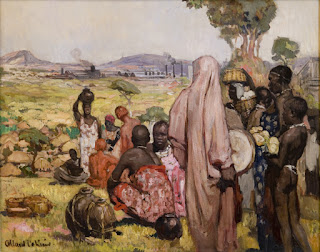
It is a good time of year for presents and gifts and WOW have I had the good fortune of listening to some amazing new music.
Run now to your music store and purchase immediately "Specialist in all Styles" which offers the glamour of Tarantino's 'Pulp Fiction', the soul of James Brown, and the poignancy of the arias of Anita O'Day. Their new album simply called "Made in Dakar" opens with a number unmistakably Baobab, ‘Pape Ndiaye’. But for me the real track of pleasure is 'Nijaay' with an opening guitar riff that rolls down the octave like Bach's Toccata & Fugue in D Minor.
For the second group we travel back Mozambique (land of the legendary Dilon Djindi, featured on TT 26/2/2007) and a group called Massukos. Their album, "Bumping" is a ball of energy, with a foot-tapping funky Hammond on ‘NDjango’ set against a dub-style groove. Back in Mozambique they are considered national treasures due to their instrumental artistry as well as their humanitarian work. They have been hailed as the next ‘Buena Vista Social club’, but this album leaves the tinny sounding drums very much in Cuba, and replaces them with solid African percussion. Other tracks such as ‘Pangira (unplugged)’ will just stop you in your tracks as the beauty of this guitar and voice cappella has this effect. The video below shows off one of their live performances and I encourage you to visit their website, http://www.massukos.org/, to discover more about this fantastic group.
Last, is a group from Tokyo that I discovered completely by chance. On myspace, http://www.myspace.com/setsubunbeanunit, they define themselves as "Traditional Space Funk" and I have to say that their music is a complete fusion of sounds and musical era’s from all music cultures. Think of Miles Davis's inspirational album ‘Bitches Brew’ crossed with Pink Floyd’s effects boxes against a backdrop of crackly old 72rpms from the 1930's. Interesting!
Have a great break during this festive season, see you for more great music in 2008.
 The London African Music Festival
The London African Music Festival





 Our first female artist to be featured on the TT captures the unique spirit of a country very close to my heart, India. They say some places on this earth can change your perspective on everything, and India is certainly that place - I think that if the same number of people in New Delhi were crammed into a similar space in London, my home town, there would be complete and utter mayhem.
Our first female artist to be featured on the TT captures the unique spirit of a country very close to my heart, India. They say some places on this earth can change your perspective on everything, and India is certainly that place - I think that if the same number of people in New Delhi were crammed into a similar space in London, my home town, there would be complete and utter mayhem. 








